#yohane anime
Text
Sunshine in the Mirror - A Breakdown
This will be a very long write-up of my thoughts on the Genjitsu no Yohane Sunshine in the Mirror anime. I will be starting with an episode-by-episode look at the story and then delving into some talking points about the show.
NOTE: There will be significant spoilers, so please don't read this unless you've finished watching the anime or have no desire to continue watching.
Also, I apologize for the length of this post and if I sound too aggressive or defensive.
Coming-of-Age Story
From the very beginning, Sunshine in the Mirror sets itself up to tell a coming-of-age story, specifically the story of Yohane overcoming her social anxiety and finding her place in the world. The first sign of this is the failed singing audition in Tokai and subsequent phone call in episode 1, where we see that Yohane is quite dependent on her mother, both financially and likely otherwise (being too dependent on others is a theme that comes up repeatedly as the story goes on). While this is not unusual for a 16-year-old, and neither is her naïveté about working more than three days a week, both show that Yohane simply isn't prepared to live an adult life yet - a life where she has to take responsibility for her own actions and provide for herself, especially when these two traits are combined with her inability to talk to most people comfortably. While it might be easy to say "just get over it," the reality is that life is usually not as simple as that. It takes significant time and support to get over that small teenage view of the world. But Yohane doesn't have as much time as a teenager in our world would due to the lack of any sort of school system to train her to be a productive adult (I will elaborate on this more later). As a result, she finds herself dependent on Lailaps to guide her through most situations, from how to talk to Hanamaru again to establishing a way she can get by every day in Numazu, at least in the short term.
While singing for Hanamaru in episode 1 is an important step for Yohane in communicating with people better, it's episode 2 where we see her take bigger strides in understanding how adult life works and settling into the role that, as we learn much later, Lailaps has created for her. Of course, her progress isn't without its bumps in the road. Being a fortune teller sounds like an easy enough job, but even that requires effort to pull off, something Yohane clearly didn't know before attempting it. That's not to mention accidentally hurting Hanamaru's feelings by insisting that money is all that matters in a working adult life (something that a number of grown adults in real life seem to believe as well). Nevertheless, thanks to Lailaps, Yohane starts to understand that some of her beliefs were mistaken. Her subsequent decision to make up with and support Hanamaru is perhaps the first sign of taking initiative that she shows in the story, with the second coming in the next episode along with the first sign of how dangerous the Calamity can be.
There's not too much to say about this episode as it largely consisted of the "Be as One" fight scene and Mari's introduction. The one thing to point out here is that Yohane takes an important, albeit not flashy step forward by getting Dia and Chika to stop arguing and start cooperating. Saying something like "hey, get it together" might not sound like anything of note, but for someone who struggles to speak with strangers, saying that to two strangers who are wielding weapons is legitimately an accomplishment (ask an introvert in real life and they will probably agree). The praise Yohane receives from her more combat-adept peers seems to give her a boost in confidence, something which carries over, albeit in subtle ways, into both her conversation with Mari and the events of episode 4.
Episode 4 is where we see Yohane get more of a glimpse into the everyday working lives of You and Kanan. While she starts to appreciate the value of contributing to society in episode 2, she's still only doing odd jobs right now, so having a chance to be on the front lines alongside girls who have established jobs is a valuable experience for her. This is also where we see the confidence boost from episode 3 start to show. There are a few times where Yohane instinctively gives a retort in response to something Kanan says, only to apologize afterward, even though Kanan doesn't think she's being rude at all. Yohane is starting to feel more comfortable being herself around people now, though she still has a little ways to go before she can really consider herself their equal. While delivering mail and repairing a swing may not be huge accomplishments or relate specifically to the trials that Yohane must overcome as a person, they do represent a recurring theme in the first half of the story: the idea of Yohane learning more about how to find her place in the world from the girls who have, for the most part, already found their own places and want to help Yohane find hers. Having spent this time learning from her more life-experienced peers, she's now ready to start acting on what she's learned so far. Going into the next episode, this is where we start to see some payoff from the buildup that has taken place up until now.
Episode 5 is Mari’s episode, i.e., the episode where we gain more insight into why Mari has been so reclusive up until now. While we see that she at least somewhat trusts Dia, enough to indirectly help her keep Numazu up and running anyway, it’s Yohane who is able to get Mari to open up a little bit more and take a chance on the people of Numazu. Despite struggling with her own social anxiety, Yohane by this point has learned a few things from her peers and experienced first-hand the value in trusting and cooperating with others. It’s this experience that allows her to find the right things to say to get Mari to take a stroll through the central town of Numazu and see how the townsfolk feel about her after so many years. And it’s the combination of this experience and how she can relate to Mari that allows her to help her new friend through a difficult moment and learn to trust the townsfolk. This was something Yohane simply wasn’t capable of until now. It’s one of the more overt displays of Yohane taking action based on what she’s learned from the other girls, and one that comes up again in the next episode.
If episode 5 is Mari’s episode, then episode 6 could be called Riko’s episode, albeit perhaps to a lesser extent. After their encounter at the tree stump, Yohane and Mari largely stick to Riko like glue for most of the episode, seeing some of her self-doubt at one or two points. Just like how Yohane would not have been able to help Mari at the beginning of the story, the two of them may not have been able to spare Riko much attention if not for the growth each one has experienced by this point. While the “Hey, dear my friends” MV doesn’t depict events that literally happen, it very clearly depicts the nature of the relationship between these three: Yohane, who got a series of important helping hands from Lailaps and everyone else, was able to (figuratively) help Mari to her feet, and then the two of them together are able to help Riko to her feet. While Sunshine in the Mirror is largely the story of Yohane growing up with the help of her more life-experienced peers, these two episodes show that she is not the only one who has room for growth. Having now played a major role in improving the lives of two other girls on top of her smaller roles in helping out around Numazu, Yohane is starting to feel more confident in her abilities, and she starts thinking about taking initiative in certain situations. The end of episode 6 marks the end of the first half of the story, both episodically and thematically.
These six episodes were largely about introducing the setting and characters as well as having Yohane learn important lessons about living as a proper adult from the other girls. The remaining seven episodes make up what could be called an ‘independence arc’ of sorts. This half of the story focuses on Yohane going through that time all teenagers experience - the time when they’re ready to start branching out on their own more and no longer want their parents (or in Yohane’s case, Lailaps) looking over their shoulder and making decisions for them.
Episode 7 features the first instance where Yohane somewhat rejects the attempts Lailaps makes to help her. Yohane feels the need to take initiative and try to make the “girls’ night” the best it can be for everyone (except herself), partly, as we’re later told, because it’s still in her nature to want to be this awesome person who does cool things and receives a lot of praise from others. This shows us that in spite of her progress so far, Yohane still has some growing up to do. But it’s noteworthy that she’s actually willing to put in work to accomplish this now instead of trying to take the easiest possible path to fame. It’s also noteworthy that she recognizes how she still needs to rely on Lailaps for some things and, in spite of her earlier remarks, is openly grateful for her longtime companion coming to her aid again. Yohane learns another two important but less obvious lessons from Lailaps and the other girls: that it’s not good to ignore your own needs and desires and that it’s okay to rely on others for things as long as you’re not trying to have them do everything for you. After we have a chance to see everyone enjoying what is basically a day off, a break from their usual working routines, we see Yohane apply these lessons by asking the other girls to sing with her at the upcoming festival (a request that is met with an ominous reaction from Lailaps) as she doesn’t feel comfortable singing in front of a crowd all by herself yet. This leads us into the controversial(?) Episode 8.
The festival episode is certainly one point in the story where we don’t see as much growth from Yohane compared to most other episodes. Instead, it serves as more of a check-in, a way to see how far she’s come as well as how much room she still has to grow. For most of the episode, we see everyone either running stands or just enjoying the festival. In particular, we see that Yohane appears to have learned that the proper way to run a fortune-telling shop is to make vague statements about people’s future and not try to predict the weather. She also appears to be a little more comfortable being herself now, exchanging some light banter with the little kids from the earlier episodes, having them accept her doing so, and even getting their assistance running the food stall without having to ask them. By this point, Yohane has a very different reputation in Numazu than she did in the beginning; she’s started to establish a place for herself in the town she once turned her back on. The second portion of the episode, featuring the scramble to find Yohane’s lost staff, has several things happen, albeit in a way that perhaps could have been reorganized. The main takeaway from the ordeal is that Yohane is still just starting to climb out of her shell and is at a point where she is very vulnerable to the idea of failure. She’s come a long way since she first returned to Numazu, and she’s terrified of having everything she’s built up come crashing down all at once. While it may not seem like a big deal for her to lose her staff when she just plans to sing on a stage with the other girls, the point is that she’s dependent on that staff and doesn't think she can sing with everyone and stop the Calamity without it. If she were unable to get up on that stage and sing, she might well have retreated deep into her shell out of shame, undoing all of the progress she’s made up until now (similar to something we see in a later episode, but to a much greater extent). Fortunately for our heroine, the staff is found, and the performance goes smoothly (except for stopping the Calamity, as we learn later). The one other thing of note here is how Yohane lashes out at Lailaps over the lost staff before apologizing later. Now that we’ve had a couple of episodes designed to bring all nine girls together, it’s time to see exactly how the changing relationship between the self-proclaimed siblings has affected Yohane’s growth and how it will affect her from now on.
Episode 9 begins with Yohane waking up from a dream (which happens to give us a major clue to the truth about Lailaps) and feeling very unmotivated to do much of anything. While this could be seen as a sign of regression back into the girl who thought she could get by doing the bare minimum in life, it’s more likely a sign that Yohane is feeling lost. She thinks she’s just accomplished something major (and says as much in a way which hints that she actually hasn’t), but now she’s at a loss for what to do next. Is stopping some force that she doesn’t understand what she really hoped to accomplish? Should she just be an errand girl or a fortune teller for the rest of her life? There are probably a number of thoughts like this going on in her head, and she has no idea how to sort them out. While there is a classic case of ‘just a little too late’ following this as Yohane tries and fails to keep up with Lailaps, the next thing of note is the conversation between these two later in the episode. Beyond the foreshadowing that was actually strong enough for seemingly everyone to notice, the key takeaways here are Yohane recognizing that it was Lailaps who created the opportunity for her to help out around the town as an errand girl, giving her some purpose to fulfill in Numazu, and realizing that what she really wants to accomplish is something she still hasn’t grasped yet. After a quick check-in moment featuring Yohane fitting right in with the other girls, no longer timid around them, we have the chance to see what our heroine thinks she needs to do in order to truly find her place in this world as the next episode begins.
The first part of Episode 10 follows up on both Yohane’s decision to pursue what she thinks she’s missing and her failed audition from the first episode, reminding us that she wanted to be a professional singer. Still being largely unable to say no to people when they insist on things, Yohane inevitably gets swept up into giving a speech about her time in Numazu and her second chance at a singing audition in Tokai. This leads to another disagreement with Lailaps, though surprisingly, it’s arguable that this one isn’t any fault of Yohane’s. She does make a bit of an insensitive remark about Lailaps “babysitting” her, but then she almost immediately says that she would like Lailaps to come with her both to Tokai and to her speech, only for the wolf to strongly deny both requests without any explanation. Naturally, this weighs heavily on the girl’s mind as she prepares to give her speech, even as the usual children we see around surprisingly treat her a little bit like a minor celebrity. The fact that Yohane is even able to give a speech in the first place (at least until the absence of Lailaps and the return of the Calamity) is one of the more obvious signs of how much she’s grown over the course of the story. After all, this is the same girl who could barely talk to Hanamaru in the beginning, even when it was just the two of them. Once the Calamity starts causing trouble again, we see another, perhaps more subtle sign of just how far Yohane has come when she goes to help Hanamaru and insists that she will protect Shishinoshin (Hanamaru’s boar companion). She had no sense of responsibility at all when she first returned to Numazu, and she was too scared to branch out and do much of anything involving other people except when she had to. And now here she is, swearing to protect her friend’s companion from hyper-aggressive deer, magical lightning, and potentially other unpleasant things that she doesn’t really understand at all. While she doesn’t end up doing much to resolve this situation in the next episode, her reaction to not being able to help is night and day compared to what it would have been had this happened much earlier.
The immediate danger to Hanamaru and Shishinoshin is resolved quickly in Episode 11, largely thanks to Million Dollar. While it’s unclear how Yohane feels about being unable to do anything to fend off the corrupted deer, there is zero subtlety about how useless she feels for not having ended the Calamity a few episodes ago as she throws away the staff she’s been so dependent on. This is a curious point, as it represents throwing away the bonds she’s built with the other girls (which Lailaps explicitly says at one point). It’s unclear if Yohane is aware of this and that her throwing away the staff is a sign that she doesn’t think she deserves the others’ friendship or if she’s doing so to remind herself of her own perceived failure. Whatever the case may be, we see signs that she might be on the verge of remembering or figuring out something important when she grows frustrated with Lailaps for not sharing details about what happened between them in the past (perhaps not unlike a large number of viewers watching this show). While Lailaps takes it upon herself to retrieve the staff - the symbol of everything Yohane has accomplished up until now, our heroine is practically abducted by most of her friends, who are determined to cheer her up and restore her confidence. It speaks to just how depressed she is that even the silliest antics from the other girls aren’t enough to make her feel any better. It’s not until Chika’s charismatic speech that Yohane gains a renewed sense of purpose and sets off to find Lailaps, setting up for the final resolution between the two of them.
Episode 12 is mostly about resolving the mysteries surrounding Lailaps and how those relate to Yohane’s ability to face both the Calamity as well as the challenges of everyday life. Prior to the big resolution, however, there is one other scene worth drawing attention to. When one of the children reports that her sister is outside somewhere, Yohane is the one to volunteer to find her, insisting that the others “leave it to the local errand girl.” While it’s not the first time in recent episodes that Yohane has done something like this (she did insist on protecting Shishinoshin in the previous episode), her word choice represents a dramatic shift from the early episodes where she was very reluctant to do random odd jobs around the town. Of course, rescuing a child is far from just an odd job, but it’s the desire to be useful that matters here. Not long after this comes the climax of the episode, where we learn that Yohane unintentionally cast magic to transfer a part of herself to Lailaps so she could have a close friend (or sister) to communicate with. This scene reminds us that Yohane used to have trouble talking to people in any real meaningful way and frames this major childhood event as a way for her to finally have someone she can communicate with freely. It’s here that we also learn more about what Lailaps has been thinking this whole time, namely that she’s been trying her best to look out for Yohane but has grown attached to the point where she’s a little afraid of going back to the days when the two couldn’t talk to each other, and she perhaps has been reluctant to face that fact until now. As the two communicate, they both accept that it’s necessary for Yohane to reclaim the part of herself that she gave to Lailaps as a child, not just in order to stop the Calamity, but also in order to live a functional adult life. The exchange happens, and now Yohane is ready to take initiative again and finally stop the Calamity.
Much of Episode 13 is spent showing how the Calamity is affecting everyone’s lives and contrasting that with what their lives are like when it isn’t a threat. But to focus on our heroine once again, Yohane shows her newfound confidence and understanding of herself by using her magic to communicate (telepathically!) with the other girls and ask them for their help in one last song, the aptly-named “Song of Courage,” to restore Numazu to normal. But of course it won’t be that simple, as she becomes trapped in some sort of magic bubble before the song is finished. She again doubts herself here, but this time it takes significantly less to get her back on her feet, as some encouragement from everyone gives her the strength to break free of her imprisonment and grant even more magic to their song, even having it reach every single person in Numazu. This last renewed effort is finally enough to put the Calamity to rest (for now?) and return everyone’s daily lives to normal. After checking in on everyone, we see Yohane telling Lailaps about what she’s learned and her new, more mature outlook on life. The story (so far?) concludes with the other girls all coming up to Yohane to talk about wanting to continue singing as a group going forward, perhaps implying that Yohane would be the one to take the lead on such endeavors, a role she never could have handled even halfway through this series but is likely prepared for now.
Now that I’ve broken down some key points about how Sunshine in the Mirror is a coming-of-age story, I want to focus on some common talking points surrounding the show. While my opinion on the anime may be obvious by now, I want to preface this next section by saying that I’m not trying to attack or change anyone’s opinion or necessarily “defend” the anime in this write-up. I only want to bring up ideas here that I feel are worth considering.
Fantasy
There has been plenty of discussion over how much of a fantasy show Sunshine in the Mirror really is and the expectations surrounding a show that is advertised as fantasy. This discussion, perhaps indirectly, brings up an important question: what defines “fantasy”? An adventure in another world? Characters fighting for their lives in a world with magic and strange creatures? Or perhaps just a world with different rules compared to our own, typically including magic and a variety of creatures that don’t exist in our world? While Sunshine in the Mirror does not feature much fighting or a traditional adventure about exploring the world, it does feature a world where magic exists and which features certain important differences from our own world. The first episode introduces us first to the Calamity, some kind of seemingly magical force (which we later learn is technically part of the world itself) that threatens to disrupt or even consume Numazu, and then later to the fact that magic not only exists in this world but is something Yohane is able to wield (e.g., transforming a stick into a staff), even if she doesn’t understand exactly how to wield it. Oh, and a couple of fantastical animals in the form of Lailaps and Shishinoshin. Later episodes introduce us to other instances of magic, technology, and fantastical beings in the form of Million Dollar’s blasters, the Scarlet Delta armor set, the cannon You uses to deliver mail, Tonosama (Kanan’s frog mech), the fairy version of Ruby, as well as Mari, who has horns and the ability to hear things other people can’t hear in this world, and her familiars. Looking at it like this, it appears the anime does feature plenty of fantasy content.
Of course, what’s most important is how much the fantasy content features in the show. Some elements, like Shishinoshin and Tonosama or the blasters and armor set, don’t come up very often, and it could be argued that their relevance to the plot is minimal. On the other hand, Mari’s horns and Ruby’s very existence as a fairy are more relevant to their characters. And of course, Lailaps and the Calamity are two of the most important plot points in the whole show. It’s fair to question why the less common elements aren’t featured more, but it’s important to keep in mind that this story only has thirteen episodes of runtime (and there are likely several reasons for this), so featuring more scenes that feature those elements would require replacing existing scenes. It could be argued that some scenes could easily be replaced, and perhaps even that the show would benefit as a result, but this could be argued of virtually every story that is more than a few paragraphs long, and it may be more difficult to argue that enough scenes could be replaced to accommodate more of the less-featured fantasy elements without telling a completely different story. The writers wanted to tell a coming-of-age story that takes place in a fantasy world, not a fantasy adventure with coming-of-age elements. While it’s perfectly fine to prefer the latter over the former, it’s much more difficult to argue that the writers’ preference is objectively worse. Additionally, it’s not unusual for certain elements in fantasy stories to not affect the plot much until later in a story (some of which can be very, very long), or even just remain as background elements for the entire story, not unlike some of the fantasy elements from Sunshine in the Mirror. This doesn’t mean that the fantasy elements were necessarily utilized as much or as best as possible, even considering the show’s length and the main point of the story (Yohane learning how to be a proper adult). It just means that what constitutes a “good” fantasy story is not necessarily straightforward.
Additionally, there is one other (possibly underappreciated) element of the “Mirror Numazu,” as I’ll call it, that is different from our world and also very important to the story: the expectation that 16-year-olds should have adult responsibilities (like working) and the lack of a school system to prepare teenagers for adult life. In the original Sunshine, Yoshiko has plenty of growing up to do, and while she experiences some character development, it’s hard to say she’s ready to be an adult by the end of the story. This is not a bad thing because she still has two more years of high school to prepare her for adult life. But in Sunshine in the Mirror, Yohane has to learn how to be a responsible adult now. While the other residents of Numazu are happy to help her along the way, the fact remains that she doesn’t have nearly the same amount of time or the same support structure that she would have at that age in a modern world. That might not sound like a big deal, but how many of us can truly say that we were proper, responsible adults less than a year into high school? For those of us who have finished school, how well could we have handled being thrust into a working adult life at the age of 16? Maybe we could have adapted to it in time, but it certainly would have been a more challenging experience for us. While not exclusive to fantasy worlds, per se, this difference between the Mirror Numazu and the original Numazu is arguably the single most important and unrecognized fantasy element in this story. Perhaps it’s disappointing to some that such a thing would be more important to the story than the force that threatens to consume an entire town (and possibly more), but this may have more to do with the expectations surrounding the story than the story itself.
Expectations and Differences from Sunshine
What exactly were the expectations for Sunshine in the Mirror coming in? Personally speaking, I really only ever saw comments about how this show would be the glorious return of Aqours, gracing anime again after more than four years. I never really saw anything more specific than that. It seems there are fans who expected just that. But there are other fans who seemed to expect something else. I’m aware there is a manga subtitled “Unpolarized Reflection” that apparently has more action-adventure elements. Were fans who were less satisfied with the anime expecting it to adapt that? If so, that’s not entirely unreasonable, though it’s important to keep in mind that the other Love Live! Manga tell largely different stories compared to their anime counterparts, so logic suggests that this would also be true for Genjitsu no Yohane. The idea that the two would tell different stories is also supported by the differing subtitles: Sunshine in the Mirror and Unpolarized Reflection. While it’s not unusual for an anime adaptation to add or remove subtitles, changing a subtitle into something completely different is often a sign that the two pieces of media will tell very different stories that take place in the same world. So it seems there was a relatively low chance of the anime directly adapting the manga.
But perhaps the expectations from less-satisfied fans were unrelated to the manga. Perhaps such fans were just expecting a more conventional action-adventure fantasy story? Or maybe something that would be very different from the original Sunshine? Or perhaps just something that would appeal to a larger audience than an idol show would? Or maybe an anime that would clearly be one of the best anime in a long time? Or, based on some comments, the expectation was simply that it would either be action-adventure or slice-of-life/drama but not a mix of the two. I don’t mean to claim that any of these are wrong. But I’d like to break down each one.
Starting with a conventional action-adventure fantasy, why would this be an expectation for fans who are not familiar with the manga? Simply because it’s the most common type of fantasy story? Or because of “Fallen Angel Yohane”? There is some logic in these expectations, but consider for a moment what spinoffs are usually like. How often are spinoffs made in a completely different genre compared to the works they derived from? There are examples like the Attack on Titan: Junior High, if we want to count that, but that’s an example of an action show having a comedy as a spinoff. Arguably one of the more prominent spinoffs is A Certain Scientific Railgun, derived from A Certain Magical Index. But that’s an example of an action show derived from another action show; if anything, Railgun has more slice-of-life elements compared to Index. The closest thing to meeting this expectation may be The Idolmaster: Xenoglossia, a one-episode OVA about idols fighting in mechas. To my (admittedly limited) knowledge, this was not very popular. Maybe that’s just because it was made at a time when idol shows were not especially common, when Idolmaster fans wanted to see an adaptation of the games, and when there were lower expectations for anime in general. But even if Xenoglossia might be more well-liked now than when it first came out, it would still mark only one example of a non-action show receiving an action-oriented spinoff. Does one instance mean it’s reasonable to expect that of another idol show spinoff?
What about something very different from the original Sunshine? It’s certainly reasonable to want something that differs from what we’ve come to expect, but this brings up a few questions. For one, what specific things should be different? And how different should those things be? What elements should be removed, and what elements should be retained? And why? To focus on my own opinion again, I personally consider the main point of Love Live! to be how the girls come together towards a goal and help each other grow as people in the process, and this is the main thing that makes me such a big fan of the franchise, along with things like the type of comedy and the specific balance of comedy and drama the franchise uses. These elements are mostly present in Sunshine in the Mirror, albeit with much more focus on Yohane than any of the other girls. Can a story be considered an entry in the LL! franchise if it doesn’t have these things? Was the expectation for Sunshine in the Mirror to not have them? Or maybe to only have some of them? To be an event-focused story instead of a character-focused story? It certainly wouldn’t be wrong to prefer any of these things. But this just brings back the questions of what defines this franchise for each fan. How much can change without this anime becoming, for all intents and purposes, part of a completely different franchise? I don’t believe there are any right or wrong answers to these questions, but I believe they are questions worth asking.
As far as appealing to a larger audience goes, this would be somewhat understandable. Many of us may desire to share our love for LL! with more people, especially people who dismiss the franchise simply because it’s about idols. But what may be less obvious is that there are disadvantages to having more people engage with a piece of media or media franchise. For example, consider the popular YouTuber known as Gigguk, someone known for a dislike of traditional idol shows and a love of action, adventure, fantasy, and different takes on concepts he normally dislikes (such as Oshi no Ko’s depiction of idols). Prior to Sunshine in the Mirror’s first episode, there was a meme about how Gigguk is such a sucker for fantasy that he planned to watch this show even knowing it was a Love Live! spinoff. For what it’s worth, I have no idea how he actually felt about the show or if he even finished it (though I personally doubt he did). Assuming he didn’t finish it, then the show would likely have to be very different and probably either very action-oriented and/or have writing in the top 1% of all anime for him to finish watching and legitimately enjoy it. If this happened, rather than make him appreciate the main LL! entries more, it would likely just lead to him complaining (not all that seriously, to be fair) that future entries weren’t like this spinoff. Of course, this isn’t just about one person. This also applies to many more people who have similar likes and dislikes.That said, it’s possible that changing the anime to appeal to a larger audience would also attract viewers who would actually become fans of the franchise.
But with new fans comes new expectations. When a franchise grows bigger, fans both new and old may start to think about how this increase in size means the franchise is making a lot more money, and that with more money, the franchise can and should become better. There are two problems with this way of thinking. The first is that fans may start to think that every penny the franchise makes can be applied to every part of the franchise at the same time as opposed to the money being distributed among the many different products that make the money in the first place (like spending money earned from merchandise on animation instead of spending it to create new merchandise). This is an unrealistic expectation that can lead to a lot of negativity. The second problem is that fans may apply this thinking to aspects of the franchise that cannot be objectively improved with more money. For example, fans may come to expect better stories and writing, but they may disagree over what actually constitutes better stories and writing. Some new fans may prefer to see the stories change in certain ways, while other fans may be uncomfortable with those specific changes. It could be argued that this already happens within the fandom, but with even more people watching these anime, this could happen even more. Is that something existing fans want?
Then there is the idea of Sunshine in the Mirror being one of the absolute best anime to be made in a long time. This expectation seems to assume that any of the other LL! anime were unquestionably among the best anime around the time they first aired and did not have any elements that could be criticized. And maybe that is the case for a number of fans. But if so, then what is it about Sunshine in the Mirror that makes it inferior to its modern-world counterpart? Is it just the idea that it should be full fantasy or not fantasy at all (as discussed below)? Or perhaps it’s not about LL! being near perfection. Perhaps this expectation just assumes that with enough money, this level of quality could easily be achieved (see above for why this is unrealistic). There are also two more questions that come with this expectation: how many stories, anime or otherwise, in general could be considered the best or at least one of the best around the time they came out, and is it reasonable to expect any given story to be one of them?
Finally, there is the idea of whether Sunshine in the Mirror should be a mix of more traditional fantasy anime and slice-of-life/drama. Here’s yet another question: if someone argues that it shouldn’t be, then why not? Is there a rule that says anime should only be one or the other? If not, then maybe the question should instead be about how a mix of the two should be balanced. That is, how much of one should there be compared to the other and how often should the story change focus from one to the other? Once again, I won’t even try to answer any of these questions because I don’t believe they necessarily have any right or wrong answers. I just believe they’re important questions to consider when thinking about what the show was and what it could have or should have been. And this leads into the final topic I wanted to discuss.
What’s the Point?
What exactly is the point of Sunshine in the Mirror? Why does this anime even exist? It’s not reinventing the wheel or trying to establish a new direction for Love Live! or anything like that. And it’s not telling a story about the “Fallen Angel Yohane.” So why does it exist? While it’s obviously impossible to know exactly what the staff was thinking when planning the anime, the simplest explanation is that they just wanted to tell a coming-of-age story about how Yoshiko might deal with her social anxiety and find her place in a world with no school system and where she doesn’t have her chuunibyou persona to fall back on, perhaps because they consider that to be the most important part of her character. But if that’s the case, then why make it in a fantasy world? If they just wanted to tell a story about a girl growing up and they’re not going to include any fallen angels or demons or dark magic or anything, why not just have it take place in the modern world and just have Yoshiko not go to school because of crippling social anxiety? This question also has a simple answer: why not? While the world of Genjitsu no Yohane is certainly not explained in significant detail, it does (as discussed earlier) contain a number of fantasy elements to make the setting fundamentally different from a modern world. And there are fantasy stories that could feasibly take place in a more modern world without rewriting the entire story. A protagonist with magic powers could still have supernatural abilities in some form (like Mob Psycho 100), and fantastical creatures could still appear in our world (like Digimon) and even live in our world (like Miss Kobayashi’s Dragon Maid). On the other side of the spectrum, there are stories like Restaurant to Another World, which features plenty of fantasy elements. But many of those elements are not especially relevant to the plot and mainly exist to create a less mundane setting. Of course, there are also stories that would not be the same at all if they did not take place in a fantasy world (like Frieren: Beyond Journey’s End). And while perhaps not to the same extent, Sunshine in the Mirror also contains fantasy elements that may be difficult to separate from the story (as discussed earlier). But what I’m trying to say here is that it’s not unusual for a story in a fantasy world to be less about the world or any single fantastical element and more about something that could more or less take place in our world. So why does any writer create a fantasy story that could take place in the modern world without any major adjustments? The answer is the same as it was for the last question: why not?
Closing
To close this excessively long breakdown, I want to make it clear again that none of this is meant to attack anyone or necessarily change anyone’s opinion. In spite of everything I’ve said, I have no problem with people simply not liking the show for what it was. The Love Live! franchise is very important to me, and that includes a spinoff that does not even feature the brand in its name. And after seeing some of the discourse surrounding the show, I just wanted to express my thoughts on it in a relatively organized way. If anyone reading this thinks about any of the ideas I’ve brought up at all, I would consider that an accomplishment. And if not, then oh well. In that case, if anyone is actually reading this, then I apologize if I sounded too aggressive or defensive. And I hope you enjoyed seeing my thoughts on Sunshine in the Mirror.
#love live sunshine#yohane the parhelion#genjitsu no yohane#yohane anime#sunshine in the mirror#love live
13 notes
·
View notes
Text

YES! She IS a Love Live character. This is Kohaku from the upcoming Yohane anime!
I was soooo excited to see her in the anime that I tried coloring in her key visuals.
GOD, she's so handsome!!!! 😭😭
#love live#ラブライブ#kohaku#コハク#アニメ#anime#anime art#anime girl#ラブライブ!#lovelive#yohane anime#yohanime#genjitsu no yohane#sunshine in the mirror#yohane of the parhelion
26 notes
·
View notes
Text
Mari’s design in GnY is so good omg







#genjitsu no yohane#yohane of the parhelion#Yohane anime#love live sunshine#sunshine#mari love live#mari sunshine#ohara mari#mari ohara#mari genjitsu no yohane
19 notes
·
View notes
Text
Yohane the Parhelion: Sunshine in the Mirror Spoiler-Filled Review
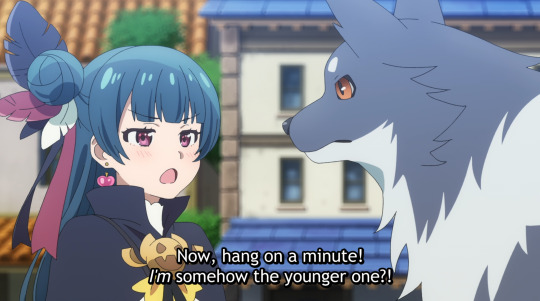
Yohane the Parhelion: Sunshine in the Mirror, also known as Genjitsu no Yohane: Sunshine in the Mirror or Genjitsu no Yohane, is a fantasy anime spin-off of Love Live! Sunshine!!. It re-imagines the characters of that series in a fantasy world. Asami Nakatani is the director, while Toshiya Ono is series writer. Yumiko Yamamoto is the character designer. Tatsuya Kato is the music composer. Sunrise, a division of Bandai Namco Filmworks, an anime studio which produced animated series within the Love Live! franchise, and Mobile Suit Gundam: The Witch from Mercury, produced this series.
Reprinted from Pop Culture Maniacs and Wayback Machine. This was the fifty-fourth article I wrote for Pop Culture Maniacs. This post was originally published on October 22, 2023.
This anime's plot is simple. Yohane (voiced by Aika Kobayashi) fails her audition to become a music idol in Tokai. She returns to her hometown of Numazu after trying for two years to succeed and failing interviews for part-time jobs. Her mother (voiced by Hekiru Shiina) pushes her to return. She meets her sibling-of-sorts, a talking wolf named Lailaps (voiced by Yoko Hikasa). She encourages Yohane to talk with her childhood friend, Hanamaru (voiced by Kanako Takatsuki), who sells fruits and vegetables. However, there are continual mysterious magical energy surges for reasons unknown. In typical Love Live! fashion, she sings on a tree trunk stage, after remembering good times she had there. Hanamaru praises her singing, while magical energy subsides.
This is only part of the story. Yohane tries to figure out her place in the world, where she fits in, and believes she is a failure because she didn't succeed in her idol auditions. Over the course of Yohane the Parhelion, she realizes that her magic can help people and that she should be honest with herself. There are hints at some romantic vibes between Yohane and Hanamaru, called Yohamaru. This likely overjoys fans of Love Live! Sunshine!! and yuri fans in general. There are episodes when they blush at one another. Even so, these vibes vary from episode to episode. In Love Live! Sunshine!!, Hanamaru and Yohane are childhood friends, and Hanamaru believes that Yoshiko is "an actual angel."
On the one hand, the use of magic, combined with the music and idolness of the franchise, in this series, may garner additional fans. On the other hand, this magic somewhat resembles healing magic depicted in Healer Girl. However, Yohane's powers aren't exclusively for healing. She doesn't have the bear magic or abilities of Yuna in Kuma Kuma Kuma Bear. The energy she exudes is only enhanced when singing with others. This is only possible after Yohane builds friendships with Dia (voiced by Arisa Komiya), who heads the town's administrative bureaucracy. Dia is assisted by her fairy sister, Ruby (voiced by Ai Furihata), and Kohaku (voiced by Mao Ichimichi). Yohane garners positive vibes from the townspeople after becoming a "glorified errand girl" rather than a fortune teller.
Voice acting in Yohane the Parhelion is superb. Kobayashi, Takatsuki, Komiya, Furihata, Inami, Saitō, Suwa, Aida, Suzuki, Asumi, Itō, Kurosawa, and Yamamoto reprise their roles from Love Live! Sunshine!!. The difference is that this series is an alternate world. In addition, Komiya voiced Mana Kase in D4DJ First Mix and Koharu Hōen in Miss Kuroitsu from the Monster Development Department. Furthermore, Saitō previously voiced Miki Fukumoto in Akebi's Sailor Uniform. Suwa voiced Kate Starven in Management of a Novice Alchemist.
Aida voiced protagonist Fūka Miyazawa in the yurish environmental-themed The Aquatope on White Sand. Suzuki voiced Jashin-chan in Dropkick on My Devil!, Miwa Honjō in Tokyo Mew Mew New, and Chiyo in Sweetness and Lightning. Kugimiya voiced Tōko Matsudaira in Maria Watches Over Us, Yamamoto in Paradise Kiss, and Yord in Otaku Elf. Asumi voiced Melty in Gargantia on the Verdurous Planet. Itō voiced Suzuno Kamazuki/Crestia Bell in The Devil Is a Part-Timer!. Kurosawa voiced Misaki Okusawa/Michelle throughout the BanG Dream! franchise, Mitsumi Iwakura in Skip and Loafer, and Ayano Toki in Laid-Back Camp. The latter will have a new season in 2024.
Other voice actors, such as Yoko Hikasa, Hekiru Shiina, Kanae Ito, and M.A.O. (also known as Mao Ichimichi), are talented too. Hikasa voiced Mio Akiyama in K-On!, Lynn Lambretta in Bodacious Space Pirates, Diana Cavendish in Little Witch Academia, the Landlord in The Great Jahy Will Not Be Defeated!, and Kaede Saitō in Encouragement of Climb: Next Summit. This fall, she is voicing Yu Bauer in the yuri isekai I'm in Love with the Villainess and Karen Helvetius in the adventure fantasy yuri The Vexations of a Shut-In Vampire Princess. Shiina voiced Ami Chono in Girls und Panzer. Ichimichi has many roles under her belt, including characters in Is the Order a Rabbit?, Flip Flappers, Teasing Master Takagi-san, Dropkick on My Devil!, Princess Connect! Re:Dive, The Executioner and Her Way of Life, or Birdie Wing: Golf Girls' Story.
Yohane the Parhelion introduces some male characters which is new for Love Live! franchise. The franchise is known for having an all-female or mostly female cast. However, these characters are one-offs. In addition, the gang of three named Million Dollar (Chika, Mira, and Shima), which saves Yohane from being swallowed up by the monsters, is new. This "gang" travels in something akin to the van in Scooby-Doo series, and has special tools and weapons. It's all a bit comical.
It isn't until the third episode that Ruby is formally introduced, after she incorporates herself into Dia's bike. That episode also introduces Mari (voiced by Aina Suzuki) on Warshmier Island. Called the "demon lord" by local townspeople, she can hear sounds from the town and beyond, while sitting in her castle, since her horns are antenna of sorts. She begins a friendship with Yohane, who calls her horns cute. She tells Yohane that she has the power of "resonance." Even so, Mari is afraid that people will see her as weird, but Yohane reassures her, She gives Yohane a present in response. Mari is very mysterious, but also very lonely.
Yohane the Parhelion avoids the focus on teenage idols in high school. Nor does it focus on the ugliness and horrific conditions of Japan's idol industry. While no characters may be relatable to gender nonconforming folks, apart from Kohaku, the characters remain driven, spunky, and gorgeous young women, like other parts of this franchise. A target demographic is straight men, but many women, especially those who are queer, have been drawn to the franchise. As such, the fandom is filled with "women and queer folks" despite belief that "obsessive male fans" dominate the fandom. Surely, some franchise elements engender a male gaze, even if downplayed. Beyond this, the songs are catchy. The girls have personalities which are distinct from one another, even though they aren't like real idols.
youtube
While recognizing criticisms and analysis of other parts of the Love Live! franchise, this series stands out. It is connected to Love Live! Sunshine!! but in its own world, as a spinoff fantasy. After all, there are new characters, characters which remain cute in this series. They differ from their portrayals in the aforementioned series. There are some parallels between depictions of Yohane and Hanamaru's childhood in that series and what is shown in this series. In addition, as noted earlier, there is a Yohamaru dynamic in this series, which has resulted in some fanart.
Yohane the Parhelion was only rivaled this summer by BanG Dream! It’s MyGO!!!!! and Birdie Wing. It never directly competed with Birdie Wing, which ended on June 24. However, the aforementioned BanG Dream! series began on June 29, four days after the first episode of this series premiered on Crunchyroll. This series also eclipsed Mobile Suit Gundam: The Witch from Mercury, which ended its 24-episode run on July 2. It would be a stretch to say this is the "best anime ever." But, this series undoubtedly mixes action, cute characters, amazing music and beautiful backgrounds all in one.
Those positive feelings toward this anime are correct. This series is a cute story about friendship and self-worth, rather than singing. The blend between fantasy and idol makes an interesting show. For instance, in the fourth episode, she helps deliver the mail with You (voiced by Shuka Saitō), meets a made from parts Kanan (voiced by Nanaka Suwa), the recycling queen, found in the ocean, named Tonosama (voiced by Nobuo Tobita). As such, this series has some nice themes about reusing and recycling. In some ways, this echoes ethos embodied in Do It Yourself!!. In that series, and the associated manga (which follows a similar storyline), the characters often use materials left behind to make trinkets, and a treehouse.
These scenes mix cute characters and Yohane realizing her place in the world. She recognizes that she is at home in Numazu, by the fourth episode, causing three stars on her magic stick to light up. Her newfound friends have become her chosen/found family of sorts. The fifth episode expands these themes to social awkwardness and acceptance. This is mostly manifested in the character of Mari. She explains that she stays away from everyone for her own self-protection. After people made fun of her as a kid, she refused to return to the town, and fled to the island.
Yohane is the driving force pushing Mari to change. Kanan and You recognize that Mari's lack of self-confidence. Dia points out that when she visited the island, accidents in the town were stopped by notes Mari left behind. In contrast, Yohane metaphorically opens up Mari's heart, recognizing she is shy, and that she worried what everyone thinks about her. This process happens at one step at a time, reflecting the reality that no one changes personalities with a finger flick. Subtly, Yohane encourages Mari to follow her back to town. Even though she does so, she has a panic attack after kids from the town swarm her without warning. By the episode's end, she starts coming out of her shell, posing as a model for photos, and meets Dia, Ruby, and other townspeople for the first time. They thank her for what she has done for their town.
This fear of others isn't unique to Mari or Ruby (who is shy). Take for example, Riko (voiced by Rikako Aida), who came from Tokyo, who lives in the town library which she "borrowed" and later begin living in. On the one hand, she saves Yohane, Mari, and Lailaps from calamity, manifested by cursed lightning and an infection-of-sorts which turns animals rabid. On the other, she lives in a library/home by herself, allowing her to focus on researching strange behavior of the animals. Later, she admits that she feels like an outsider and is bad at making friends. Her view somewhat changes after Mari relates to her, telling her that being shy isn't bad. As such, she commits to staying in town a "little longer" so her skills can benefit the townsfolk.
At the same time, Yohane is often insecure. In one Yohane the Parhelion episode, she worries she can't stand on the forest tree stage because it has been infected. In the episode which follows, she organizes a girl's night. She is overwhelmed after everyone is too excited. As it turns out, she engaged in overwork because she wanted them to acknowledge her and make memories. This manifests in cooking sweets, playing baseball, and bashing a watermelon blindfolded. In another way, the episode criticizes overwork as unnecessary, a common anime theme despite overwork in the anime industry (and declining quality).
Although the episode has slice-of-life vibes, it draws you more into the characters and their lives. It serves an important part of the story. Yohane proposes that all nine (she, Hanamaru, You, Dia, Chika, Kanan, Mari, Riko, and Ruby) sing together, so the town can be saved. On the other hand, Lailaps seems distant and appears to have her own agenda, which is not revealed until later. This happiness doesn't last. Everything goes off the rails in the next episode.
Yohane loses her staff and believes she can't sing without it. Again, her insecurity returns. Even though her new friends help her, she lashes out at Lailaps, blaming her for losing it. Although she apologizes, she admits she was nervous to sing by herself and is glad everyone could join her. In the end, she and her friends sing together in some underwater stage (or at least they think it is underwater). They sing a musical number reminiscent of many settings and songs in the Love Live! franchise.
These musical numbers are mixed with fantasy. It moves Yohane the Parhelion more toward being an idol anime with fantasy flourishes, than a fantasy anime with idol flourishes. For shippers, they were likely excited that episode had some nice Yohane/Hanamaru moments, perhaps disappointing those who shipped Mari and Yohane, for which there is some canon support. This episode sets the stage for the one after, with flashback implying that Yohane gave Lailaps the power to talk.
youtube
The episodes that follow raise the stakes. Lailaps goes missing. People think she was kidnapped. Her newfound friends pitch her to find Yohane's childhood friend/companion. Even though Yohane finds her, Lailaps implies that she will only stay by Yohane's side until she is "grown up." She won't be with her forever. This is made worse when Lailaps refuses to attend Yohane's farewell party. This comes after the latter gets a notice for an audition in Tokai.
As is a common theme in Yohane the Parhelion, Yohane's insecurity bubbles to the surface. She isn't sure she wants to attend the audition and believes she isn't ready, although town residents are excited. Yohane attends but is exhausted. She thanks everyone for gathering and giving her the experience she needs to become an idol. The party ends abruptly when Lailaps declares it is cancelled. She unleashes her emotional strain onto Lailaps, asking if she is trying to ruin everything.
Their emotional conflict is not solved. The episode ends with the calamity getting worse than ever. Possessed animals are everywhere. It reaches a fever pitch when, in the 11th episode, Yohane blames herself for everything going wrong. She throws her staff in the water, and refuses to come out of her room. She tells Lailaps that she doesn't have anything special and won't be attending the audition. With Yohane out of the picture, the townspeople are sheltering in place, scared of their lives, and Lailaps leaves, on a quest to get back Yohane's staff.
To get Yohane out of her funk, her friends bring her to a party hosted at a local hotel. With Yohane's self-confidence at a low point, she admits she is grateful. She adds that she can't accept their kindness, declares she can't do anything in return, and is "nothing special." Her friends, like Chika, cheer her up, and remind her of one simple truth emphasized throughout the Love Live!: you don't have to do everything on your own. While they are having a fun time, she agrees to apologize to Lailaps. The latter is barely surviving after rescuing Yohane's staff.
The Yohane the Parhelion penultimate episode begins to wrap up plot threads. Everyone is evacuated from the town, Riko saves a little kid, and Lailaps runs away again. Unlike the time before, Lailaps left so that she and Yohane could bond once again, causing her to recall long-lost memories of a fight between them before she left for Tokai. She realizes that Lailaps knew she was magic all along. In a way, Lailaps is her "mirror," hence second part of the anime's title "Sunshine in the Mirror." She sings a song, in typical Love Live! style, blows up her favorite tree stump stage, and realizes that the staff isn't magic, but she is! Sadly, one result is that Lailaps can only bark since she only was able to speak (in human language) thanks to Yohane's magic.
While this episode disproves those who claimed that Lailaps isn't real, it has more similarities to World Dai Star, than any other series. That latter is a mixed-media project by Bandai Namco Filmworks, created by Egg Firm, and written by Takahiro. Miko Pikazo does character designs. The anime adaptation aired from April to June of this year. In that series, Shizuka is the "sense" of Kokona Ōtori, helping her become a World Dai Star. Regardless of possible sanism (also known as saneism, mentalism, and mental health discrimination/stigma) or plurality metaphor, or yurish undertones, that series differs from this one.
In Yohane the Parhelion, Lailaps is not imaginary or a manifestation of Yohane. Instead, Yohane wishes Lailaps had the power to speak human language at an early age. However, this magic has a time limit, which Lailaps recognized, but Yohane did not. This differs from Elena Castillo Flores bringing a stuffed animal to life in the final season of Elena of Avalor, with her now-emotion-based magic, or Adora turning a unicorn into her mouthy steed, Swift Wind, by accident.
The series finale ends the series on a definite note. Everything seems perilous. Residential evacuation proves difficult. The town is surrounded by infected trees. The administrative bureau even loses power. However, Yohane talks to everyone with her magic and her friends come, allowing them to sing together in hopes they can sing the town. Their song has the typical Love Live! flair. To keep up the suspense, the song ends thanks to overly powerful evil magic.
In line with other themes in Yohane the Parhelion, which emphasize togetherness, and camaraderie, Yohane gets out her funk, comes back, and sings with her friends once more. With combined resonances from she, and her friends, along with everyone in town, the evil energy disappears, with everything back to normal. The reconstruction comes next, with everyone doing their own task in the town, while Yohane says she will stay in town rather than going to Tokai. The reason for this, in her view, is simple: she wants to stay in the place that she loves and do things with people precious to her.
The ending sequence in the series finale has elements of the usual ending sequence, but has some different scenes. There is a post-credits scene in which Yohane says the entire world is song, with happiness, sadness, rage, screams, and says songs change over time. In a possible hint at a continuation, all her friends say they want to sing together again, and she readily agrees. This series is a 13-episode-long sleeper hit. It is neither a wasted opportunity, nor mediocre, but cute.
youtube
Although more could have been done with a longer season, Yohane the Parhelion is good for what it was. Even so, a spinoff or second season would be nice. On the other hand, the existing series is wrapped up succinctly. A continuation could muddle that. Whether this finale has Symphogear vibes or not, singing saves the town. The latter somewhat resembles what Steven Universe is known for. Songs are only one part of that series.
I could continue to write about this, either noting that opening song began each episode with a bang, or that some yuri fan sites wrote about the series. This isn't even mentioning the web radio program, associated games, or crossover chibi anime. More than that, I'll remember this series for its talented voice cast, mix of fantasy and idol genres, socially awkward characters, and themes of togetherness and family.
Yohane the Parhelion: Sunshine in the Mirror can be streamed on Crunchyroll.
© 2023 Burkely Hermann. All rights reserved.
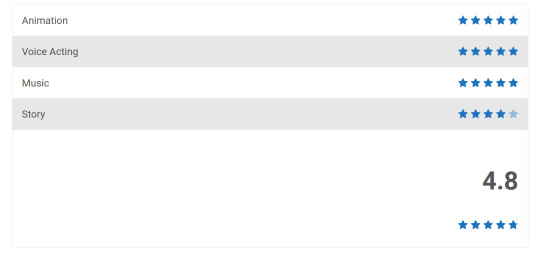
#genjitsu no yohane#yohane the parhelion#yohane anime#yoshiko tsushima#love live sunshine#love live#idol anime#fantasy anime#anime#reviews#crunchyroll#yuri subtext#music anime#voice actors#Youtube
0 notes
Text
TV Anime "Genjitsu no Yohane -SUNSHINE in the MIRROR- (Yohane the Parhelion -SUNSHINE in the MIRROR-)" - First PV
'Love Live! Sunshine!!' Spin Off
This anime is scheduled for July 2023 (Studio: SUNRISE)
youtube
#anime news#anime#アニメ#anime trailer#yohane#yohane anime#GJ yohane#love live#SUNSHINE in the MIRROR#幻日のヨハネ#ラブライブ#Youtube
0 notes
Text


MIRACLE WAVE
#love live#love live sunshine#aqours#miracle wave#anime#animeedit#fyanimegifs#anisource#dailyanime#dailyanimatedgifs#animangahive#chika takami#riko sakuraushi#you watanabe#mari ohara#dia kurosawa#kanan matsuura#ruby kurosawa#hanamaru kunikida#yoshiko tsushima#yohane tsushima#animangaladies#gif#gifset#ll anime
168 notes
·
View notes
Text
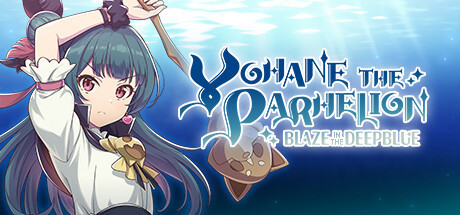
SURPRISE! Did you think the day would come when we would cover Love Live on this blog? I didn't!
Yohane the Parhelion: Blaze in the Deepblue is the Metroidvania-style game based on the fantasy spin-off of Love Live Sunshine, but you probably don't care about that! Statistically speaking, our target audience is Bogleech readers who are deeply revolted by anime girls!
So why bring up? Why bring it up? The answer is 🐠 FUNNY FISH! It's Funny Fish Friday!
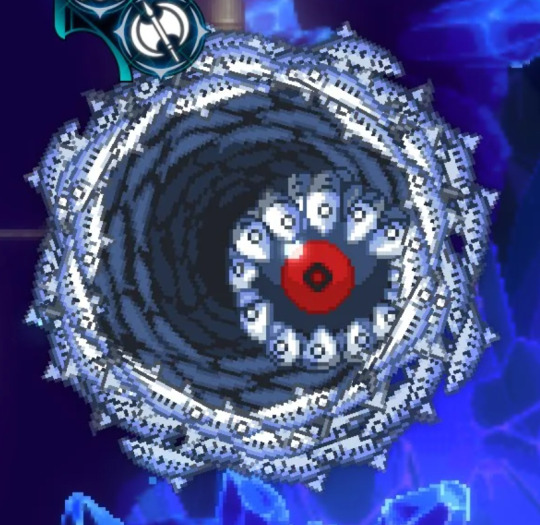
Since this game is set in an underwater temple, the enemies this game are all based on sea creatures, and that's cool! Again, statistically speaking, you probably think sea creatures are cool. I really liked seeing the variety of enemies when playing through this game, so I thought it'd be fun if I could share them with an audience of people who otherwise wouldn't care! None of the enemies really have names, as far as I'm aware of. But I'll do my Rubesty...?

Our first guy we encounter in the game is the sort of guy who emerges from the ground like the Zombies from Castlevania, and wow! A good first impression I think. It is sort of a squid mantle, if the mantle was also a cloak for a spooky sort of wizard! The way it doesn't really have a 'face' in the hood and the eye is below really makes it seem like a weird mimic creature. Cool!

They also get a tough lategame variant which looks like a mix between a flapjack and a vampire squid. You don't often see flapjacks be designed as scary!
---
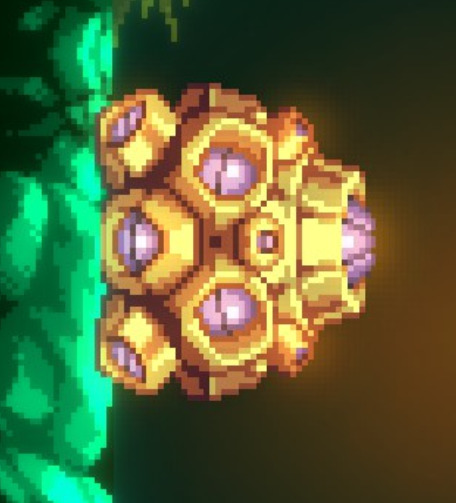
Next is Barnacles! A whole clump of them, like a cake. They shoot Energy Balls at you. Is this what Barnacles can do if they combine their powers...? The top actually opens up, and it looks a lot like a sea urchin's mouth! So maybe it is some sort of naked urchin creature covered in barnacles? Game Theory!

There are also barnacles with Ice Powers. Like real life!
---

Let's give it up for Garden Eel!!!!
What a fine Garden Eel it is! Complete with the sort of grumpy face, and with the addition of two little arms that make it look like it's praying or maybe a bit shy. But it is mean! It also spits energy balls at you, then hides in the hole so you can't hit it. How very sneaky!

SO sneaky, in fact, that these eels have mastered the art of ninjutsu! The ninja eel shows up for a split second in one single room, before smoke bombing away. You'd have to use a time freeze power to get him, but I never got around to doing that. I don't have any beef with a ninja eel! I respect him and his training!

Did someone say CTENOPHORE? I hope you did, or my hearing has really gotten worse. This thing is a grade A ctenophore, only with a ring of Scary Teeth! A little scary to think of a ctenophore who could Bite you, but nonetheless this deserves a :ctenopog:!
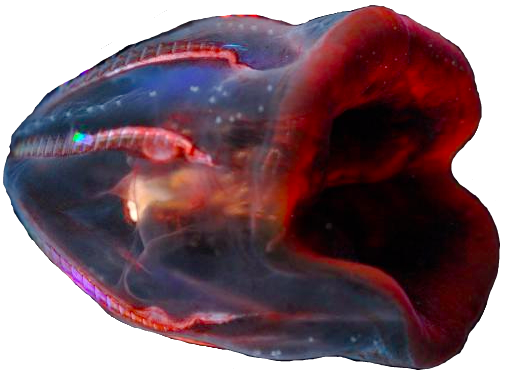
---

Let's not forget Fish Vortex! Fish Vortex was the first guy to make me go 'wow, this game's enemies really are awesome!' So of course I had to put him at the top of the post! He is my selling point! I am selling all these enemies to you. For 4.99 a pop!
Anyway. This design is just so funny and cool at the same time. A swirling school of fish that leads into an endless dark abyss, and in the middle, a big eyeball. Also covered in fish. It shoots fish at you! Yay!
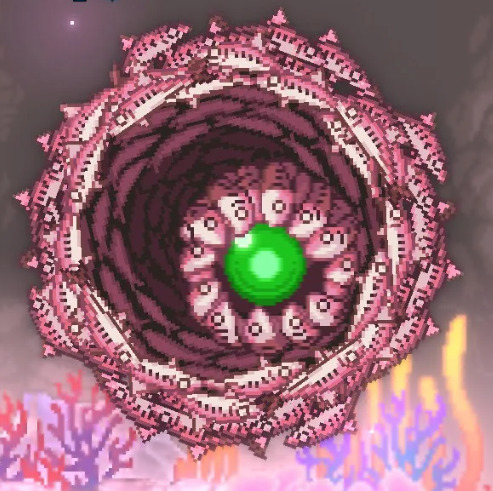
There is also a pink variant - it shoots fish that give you the Solitude status effect, which basically just makes Yohane too depressed to summon her friends. Meaning? They are Depression Fish! Maybe she just becomes so jealous of the unity and teamwork of these sardines. She's me like just for real! ^_^
---

isopot :)
---

This slug is an umbrella. That is ridiculous! Ridiculously EPIC! It does the opposite of shield you from rain, which is create rain, that kills you. But I would still want one as an umbrella.
---
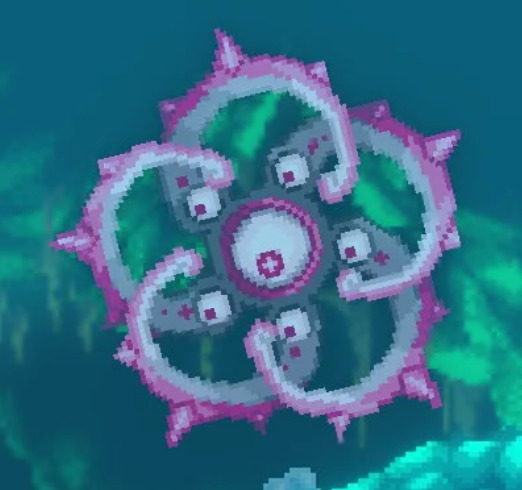
When I first saw this thing, I thought it was some strange round Echimoderm I had never heard of. But upon further inspection (I actually asked Mod Chikako shh), it is obviously like a Brittle Star, with each arm folded round to form a wheel! How creative and fun! It even has a bunch of eyes like a starfish!
---
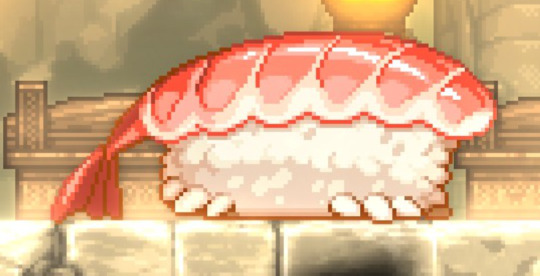
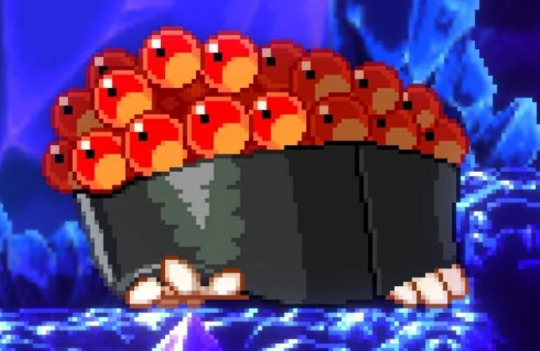
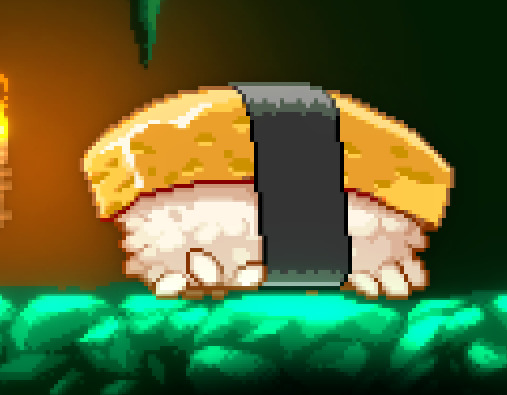
Last but not least- sushi! There are sushi guys and they are cute. They don't really do much and are typically found in their own rooms, so I'm not sure what the point of them is. But finding a funny walking sushi should be a reward in of itself, I guess! Look at their funny rice feet! Or the one with the roe eyes!

I happened to use fire magic on one of them and this happened. Oopsies...
Now I am sure you are saying, thank you for showing me all these funny enemies. But are there any cool bosses? Of course there are, me! What's a Metroidvania without cool bosses? So I shall show you my favorites without delay!
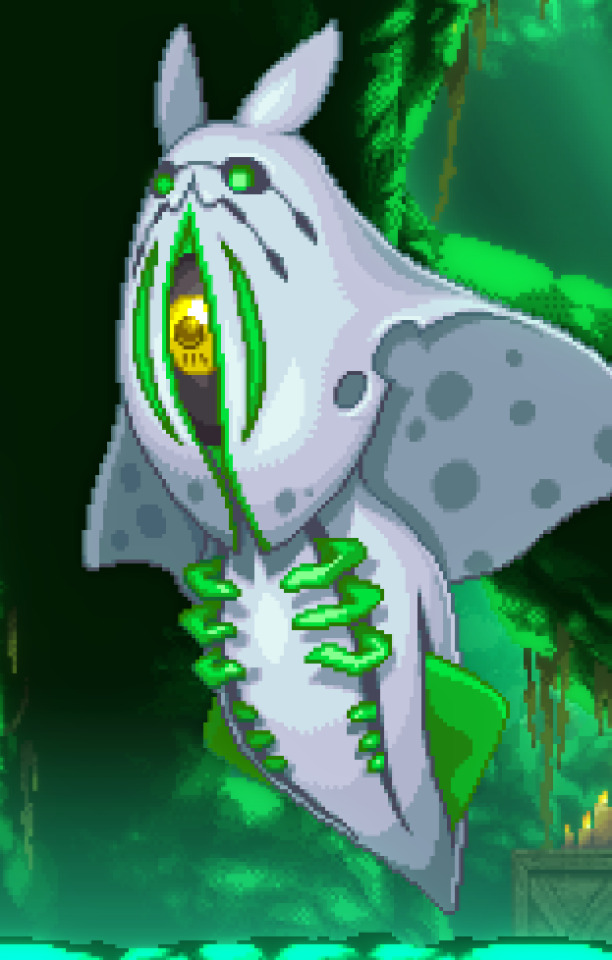
First is this freak (affectionate)! It is a sort of amalgamation of lots of different animals and I think it just looks plain cool! Two squid mantles combined into one, a bit of a sea angel shape, bug legs and of course a great big eyeball!
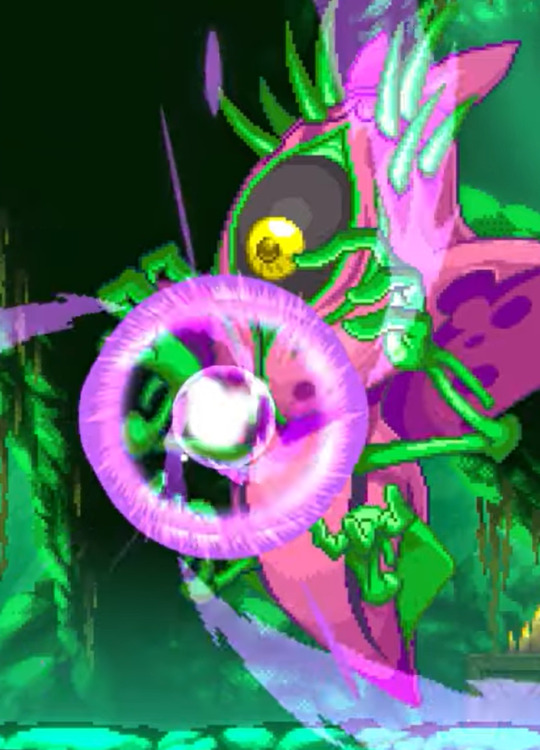
If it is not freaky enough for you, let it be known that the bug legs turn into big green skeleton hands, and it also keeps getting pinker, and it grows new eyes and then extra horns grow out of those eyes. If THAT is not freaky enough for you then I am sorry but I cannot do anything about that.
---
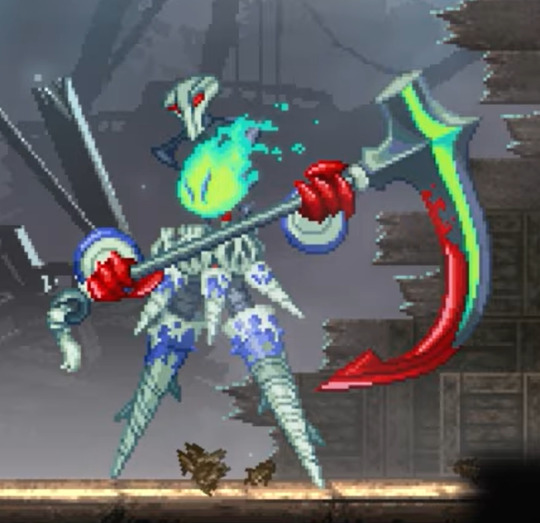
Now, how about a sampling of this Freaken Thang? It honestly doesn't seem that sea-creature themed, but it uses seashells so I guess it counts!

What is really neat is that this boss has two different forms, upside down and rightside up! When it is upside down it looks a bit like a Magolor type creature. And of course, I really like the flame thing in the middle as well, that really feels like a Kirby enemy or something! Like a wisp made of plasma!
---
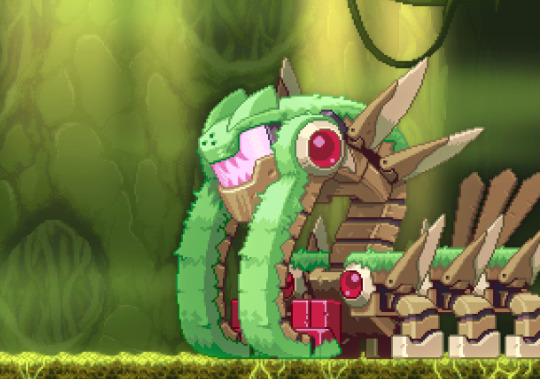

Fans of Anomalocaris won't be disappointed by this one! It's a big Anomalocaris tank and boy is it cool! There's something for everyone here, whether you're an Anomalocaris purist or you've always wanted to see it turn into a sort of futuristic beast with a screen mouth that shoots lasers! It really is the future, zura...
---
After covering all these wacky creatures, I'm going to have to end it off with the final boss! What could the big bad, the ultimate boss of all these sea monsters even be, I wonder? Well, it's...
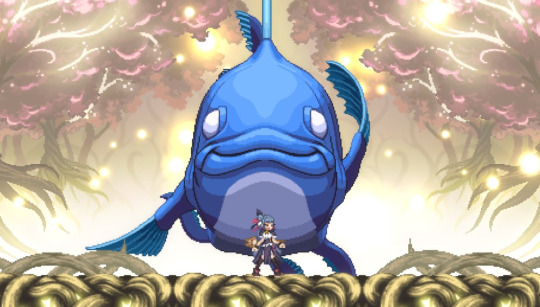
...a coelecanth. Just a big coelacanth! It is big and blue! And really, does it need to be anything else? It is such an honor to make the biggest ultimate boss a coelacanth. It is even pretty cute!! Think he's smiling! 😊
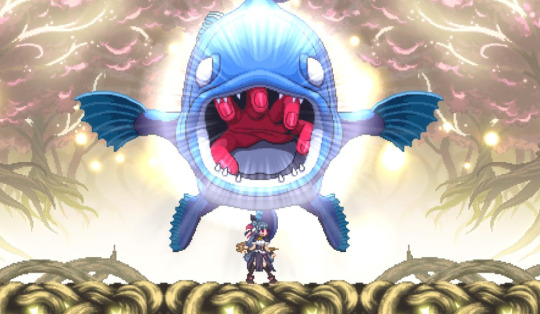
Uh oh! Is it still cute? I guess so. My first thought seeing this was of course the world-renowned tongue eating isopod, so I really hope it was an intentional reference! It probably just wants to shake hands. Still, a pretty simplistic design for our final boss, right?

Buu buu! Its true form actually looks like this! Actually, it's kind of doing too much. Like let's tone it down a little?
So!! We beat the mega ultra coelacanth, and now we can find out what his motivation is! And it is... that he is the memories of the people of the past or something. And they all didn't want to be forgotten, so they turned into fish monsters! But we forgive them!
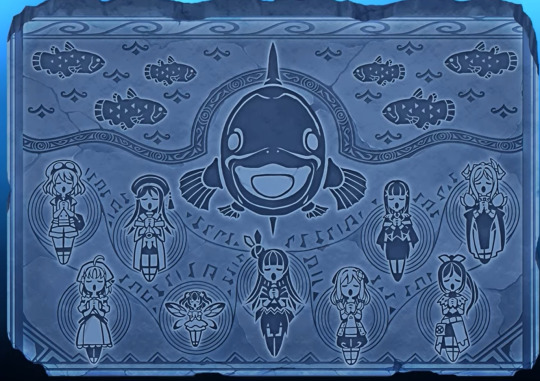
It doesn't really matter. All the girlies gather around and sing him a song. Look how happy he is! I forgot I was talking about a Love Live game until now, actually. All's well that ends well, the end, et cetera! Hit it, Yohane! [imagine this is like the end of a kids movie where all the Love Live girls are having a dance party and there is a shot of the big coelacanth in jail and he's tapping his mouth fingers along to the beat]
#funky friday#yohane the parhelion#genjitsu no yohane#yohane the parhelion: blaze in the deepblue#not mario#mod f boy#yes it was me! i was the weeb mod who played the love live game!#and now i must burden you all!#i wrote this all in one go hooray for ritalin#tw anime girls
309 notes
·
View notes
Text

#genjitsu no yohane: sunshine in the mirror#yohane the parhelion: sunshine in the mirror#genjitsu no yohane#sunshine in the mirror#love live! sunshine!!#love live!#幻日のヨハネ -sunshine in the mirror-#yoshiko tsushima#anime#mygif#mygif:genjitsu no yohane
943 notes
·
View notes
Text
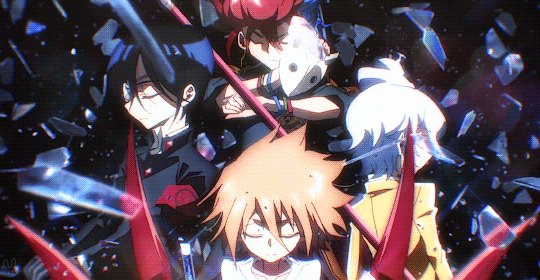
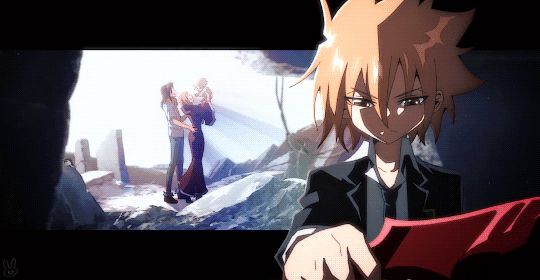
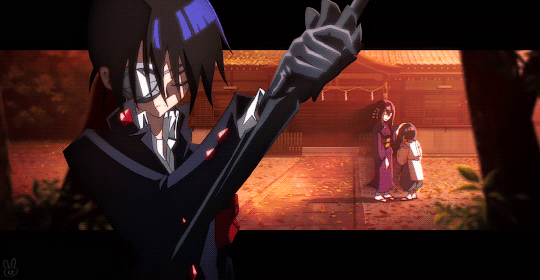


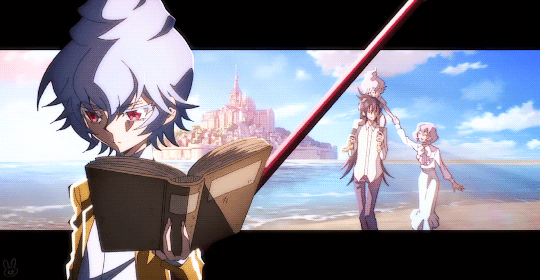
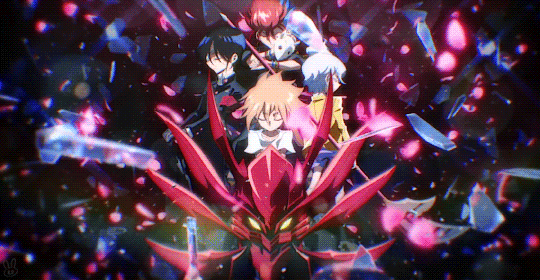
♫ DEAR PANTA RHEI | Shaman King: FLOWERS ED
#INSAAANE they were insane for this why would they do all that!!!! the song is so good too TwT#shaman king#shaman king flowers#hana asakura#yohane asakura#gakko ibuki#men tao#anime gif#animeedit#shounenedit#anime#anime op/ed#*#fyanimegifs#animangahive#animangaboys#shaman king 2021#yoh asakura#anna kyoyama#ren tao
274 notes
·
View notes
Text


Tsushima Yoshiko ; Love Live! Sunshine!! ☆ Good Smile Company
#bonus post!!!!!#tsushima yoshiko#yoshiko tsushima#yoshiko#yohane#yohane figure#yoshiko figure#love live yohane#love live yoshiko#yohane tsushima#tsushima yohane#love live#love live figure#llsip#love live school idol project#love live sunshine#love live school idol festival#llsif#llsif figure#lls figure#nendoroid#good smile company#anime#anime figure#anime figurine#figure#figure collecting#scale figure#figurine#anime collecting
130 notes
·
View notes
Text

Far far away
#love live#art#anime#artists on tumblr#aqours#genjitsu no yohane#sunshine in the mirror#yohane#yoshiko tsushima#yohane tsushima
577 notes
·
View notes
Text

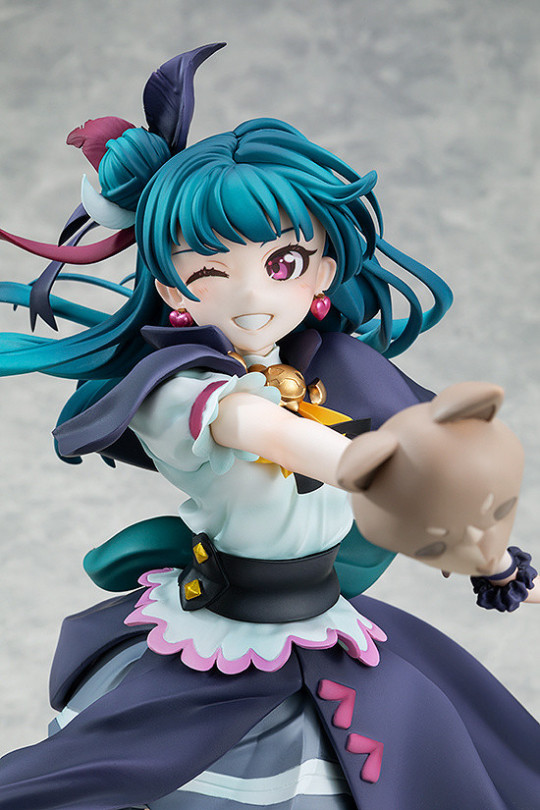
♡ Yohane (Love Live!) - Kadokawa
#yohane#yoshiko tsushima#kadokawa#genjitsu no yohane#love live sunshine#love live#figurine#figure#anime figure#anime#anime figurine#bishoujo#1/7 scale
125 notes
·
View notes
Text
Kanan finally!! Lets goo. Such a cute episode.
The flying delivery job was really fun. You can see Yohane gradually growing over these last couple episodes. You and Kanan stole the show for me though. They were so funny.
Ok Yohane is filling out those stamps, just two more to go. But that “I’m sorry” from Lailaps looked really ominous. Title of next week’s episode suggest we might be getting a tone shift :/. Can’t wait to find out what the demon lord’s secret is





#summer anime 2023#anime summer 2023#2023 summer anime#summer2023anime#love live#love live sunshine#love live aquors#aquors#Yohane anime#Yohane love live sunshine#genjitsu no yohane#yohane of the parhelion#yohane tsushima
7 notes
·
View notes
Text
Peter x Female Reader platonic
This was a request by someone.
@authorrikey15 I believe this is your request? It might not be related but I make a part 2 to clear it up. This is kind of in peter pov something like that

You are in your early 20 while 18 when you meet him (old version)
Y/n L/n or her nickname N/n. Born in [a country you want except Korea]. She was on one of her missions that was ordered by Raphael himself.
Y/n was a skilled fighter. She has been trained since she was little. Not knowing her mother she only has her father.

As you were walking towards your new destination (for your missions). You stumbled across an old man (Peter). He looks like he needs some help at his store.
“Mr? Do you want me to help you?” Ask you.
As the old man (Peter) looks at you. He smiled gently. “It's okay now miss, I'm fine now go. Your school is about to start”
“O-oh sure!”

That was years ago…(2 years)
Now Peter is young again and getting his revenge for the glory.
As he was walking around the town/city. He stumbles upon a woman (you). He was about to apologize when he noticed the blood stain on her…well clothes?
It was kinda like a nightgown with white color.

You were walking like a zombie in the middle of the night. After knowing your father betrayed you by making you a killing machine for glory. Well that isn't a father daughter moment for sure.
A man grabs your arms. You were just about to kick the man when you suddenly felt dizzy and finally faint.
A single tear falls at the corner of your eyes.
Timeskip
Peter was preparing some food for you and him.
As for you, you just woke up in confusion.
“Where am I”
“At my place”
“Who are you?”
“....my name is Kim Sun Gu” (I use webtoon translation the name can be seen as Sun-Gu Kim too)
“Oh…well my name is y/n…”
He chuckled and patted your head.
Now years past (5 years let just say…well..he got his revenge ✌️)
The glory has finally met its downfall. He has finally revealed his secret to you about him being Peter.
But you just smile at him and from there on…he has decided to ‘adopt’ you!
And thus, you call him father from now on.
He was reading his newspaper at noon, waiting for you to finish your study’s.
Then he heard the door open and stood up to greet you.
But somehow…
“Father, look! This is my boyfriend!”
There In front of him stood Kageo (let just pretend he's 28 or 30 reader is 26😀)
Both of them look at each other dumbfounded.
“U-uh”
“Father?” You call out to Peter. He was silent when he walked to the kitchen and slowly, and SLOWLY took a knife out.
Kageo is running already.
“W-wa!! No!! Father stop!!!”
“I'M GONNA KILL YOU!!!”
“HOW WOULD I KNOW SHE'S YOURS!!”
the end.😎
#female reader#anime#x reader#manga#yandere#platonic#request are open#my ocs#oc x reader#peter x reader#killer peter#peter#kageo#yohan x reader#nathaniel x reader#simon
42 notes
·
View notes
Text

Today's anime cats of the day are:
These two sweeties from Yohane the Parhelion: Sunshine in the Mirror!
102 notes
·
View notes
